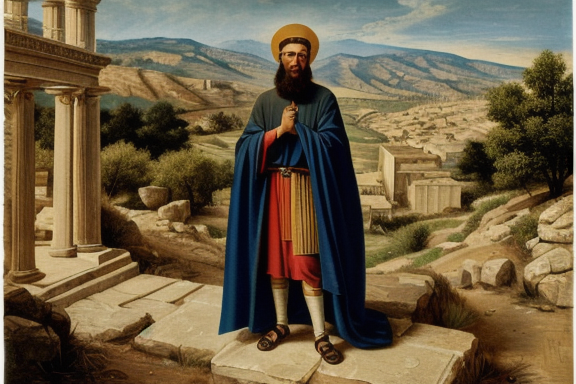Benjamin was one of the twelve sons of Jacob and Rachel, making him the youngest brother of Joseph. His birth was a bittersweet moment for Rachel, who died shortly after giving birth to him. Despite his tragic beginning, Benjamin went on to play a significant role in the history of Israel.
In the Bible, several notable figures were descendants of Benjamin. King Saul, the first king of Israel, was from the tribe of Benjamin. Despite his initial success, Saul’s reign was marked by disobedience to God’s commands, leading to his downfall. Another prominent figure from the tribe of Benjamin was the apostle Paul. Originally named Saul, he became one of the most influential figures in early Christianity after his conversion on the road to Damascus.
Benjamin’s role in the Bible extends beyond his lineage and descendants. During the time of the judges, the tribe of Benjamin faced a severe crisis. In the book of Judges, a horrific incident occurred in the city of Gibeah, where a Levite’s concubine was brutally assaulted and killed. This act of violence led to a civil war between the other tribes of Israel and the tribe of Benjamin. The war resulted in the near annihilation of the tribe of Benjamin, with only a remnant surviving. This event serves as a reminder of the consequences of moral depravity and the importance of seeking justice and righteousness.
Benjamin’s Birth and Early Life
Benjamin, one of the twelve sons of Jacob, played a significant role in the biblical narrative. His birth and early life were filled with interesting events and meaningful encounters. Let’s explore some key aspects of Benjamin’s journey.
Benjamin’s Birth and Name Meaning
Benjamin was born to Jacob and his beloved wife Rachel. His birth was accompanied by great joy but also marked by deep sorrow, as Rachel sadly passed away during labor. Jacob, grieving the loss of his wife, named their youngest son Benjamin, which means “son of my right hand” or “son of the south.” This name symbolizes a position of honor and strength.
Benjamin’s Relationship with Joseph
Benjamin shared a special bond with his older brother Joseph. As the sons of Rachel, they were the only full brothers among Jacob’s children. This connection fostered a deep affection between them. Joseph, who was sold into slavery by his other brothers, eventually rose to become a powerful ruler in Egypt. When Jacob’s family faced a severe famine, Joseph invited them to Egypt to provide for them. Upon their arrival, Joseph was overjoyed to see Benjamin and treated him with great favor.
Benjamin’s Journey to Egypt
Benjamin’s journey to Egypt marked a turning point in his life. When Joseph’s brothers made their first trip to Egypt to buy grain, Joseph tested their character by falsely accusing them of being spies and demanding that they bring Benjamin to prove their innocence. Jacob initially hesitated to send Benjamin, fearing another potential loss. However, the desperate need for food compelled him to allow Benjamin to accompany his brothers on the journey.
Arriving in Egypt, Benjamin and his brothers faced a series of unexpected events that led to a dramatic reunion with Joseph. Joseph, overwhelmed with emotion, revealed his true identity and forgave his brothers for their previous betrayal. The reunion brought immense joy to Benjamin, who witnessed firsthand the restoration of his family and the reconciliation that occurred.
Benjamin’s Descendants
After Benjamin’s birth and eventful journey to Egypt, he went on to establish a prosperous tribe with numerous descendants. Let’s explore the lineage of Benjamin, including his sons and grandsons, as well as his tribe’s presence in the Promised Land.
Benjamin’s Sons and Grandsons
Benjamin had ten sons, who went on to become the founders of prominent families within the tribe. The names of Benjamin’s sons were Bela, Becher, Ashbel, Gera, Naaman, Ehi, Rosh, Muppim, Huppim, and Ard (1 Chronicles 8:1-2). These sons, along with their own descendants, contributed to the growth and development of the tribe of Benjamin.
One of the notable grandsons of Benjamin was Ehud. He was a valiant judge of Israel who delivered his people from the oppressive rule of the Moabites (Judges 3:12-30). Ehud’s courage and strategic thinking showcased the strong character that ran in Benjamin’s lineage.
Benjamin’s Tribe in the Promised Land
When the Israelites entered the Promised Land, the tribe of Benjamin received its allotted territory. The land assigned to Benjamin was located to the north of Judah and included the city of Jerusalem. This strategic location made Benjamin’s tribe an important presence in the region.
The tribe of Benjamin was known for its skilled warriors. The Benjamites were renowned for their proficiency in battle, as depicted in the story of the civil war between the other tribes of Israel and Benjamin (Judges 20). Despite being outnumbered, the Benjamites displayed great courage and fought valiantly.
The city of Gibeah, located in Benjamin’s territory, became a significant center for the tribe. It served as the hometown of King Saul, the first king of Israel, who hailed from the tribe of Benjamin. Saul’s reign marked an important chapter in the tribe’s history and solidified its influence in the region.
Throughout the centuries, the tribe of Benjamin continued to play a significant role in Israel’s history. From the time of the judges to the period of the kings, Benjamin’s descendants contributed to the nation’s development and served as key figures in various events.

Benjamin’s Role in the Bible
Benjamin, the youngest son of Jacob and Rachel, played a significant role in the biblical narrative. His tribe, known as the Tribe of Benjamin, had a prominent presence in battles and produced famous descendants who played crucial roles in Israel’s history.
Benjamin’s Tribe in Battle
The Tribe of Benjamin was known for its skilled warriors and played a vital role in several military campaigns. One notable instance was during the conquest of Canaan, where the Israelites, led by Joshua, faced numerous enemies. Benjamin’s tribe stood alongside the other tribes and fought valiantly to secure their inheritance in the Promised Land. Their bravery and military prowess were instrumental in achieving victory in many battles.
One remarkable battle involving the Tribe of Benjamin is recorded in the book of Judges. The Israelites were at war with the tribe of Benjamin due to a grave offense committed by some of its members. Despite being outnumbered, the Tribe of Benjamin displayed great strength and tenacity, resulting in a series of intense battles. Eventually, the other tribes prevailed, but this conflict highlighted Benjamin’s reputation as a formidable opponent in warfare.
Benjamin’s Famous Descendants
The Tribe of Benjamin produced notable descendants who played influential roles in Israel’s history. One of the most well-known figures was King Saul, who became the first king of Israel. Saul’s reign marked a significant transition for the Israelites as they shifted from a tribal confederation to a monarchy. Although Saul’s reign ended in tragedy, his impact on Israel’s history cannot be overlooked.
Another famous descendant of Benjamin was the apostle Paul, also known as Saul of Tarsus. Paul played a crucial role in the early spread of Christianity, authoring several of the New Testament books and undertaking missionary journeys to share the gospel. His conversion on the road to Damascus is a widely recognized event that transformed his life and shaped the course of Christianity.
Benjamin’s tribe, through these famous descendants, left a lasting legacy in the biblical narrative. Their contributions in battles and the spiritual realm shaped the course of Israel’s history and the development of Christianity.

Rockin’ the faith, one verse at a time!
Growing up, the Bible’s stories deeply impacted me. Now, with over 15 years of preaching experience, I blend timeless teachings with modern technology, making them relevant for today’s world.
Bible Hub Verse is my platform to share historical insights and thought-provoking articles, exploring both familiar and uncommon Christian topics. My passion is building a welcoming online space for everyone to learn, grow in their faith, and discover the Bible’s enduring message.
Join the journey!
God bless you.













